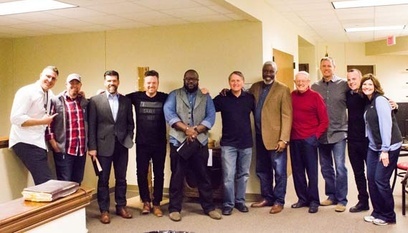Randy Alcorn's Blog, page 136
March 17, 2017
Ray Ortlund on What Makes a Gospel-Centered Church

I deeply appreciate Raymond C. Ortlund Jr., just as I did his father and mother, who I’ve mentioned before. I have really enjoyed Ray’s powerful little book, The Gospel: How the Church Portrays the Beauty of Christ, which I would highly recommend to anyone desiring to start or help refocus a church on the Gospel. This is a segment from the beginning of that fine book (which is available from Amazon and Christianbook.com).
News to Make Man’s Heart Glad
Evangelion (what we call “the gospel”) is a Greek word, signifying good, merry, glad and joyful news, that makes a man’s heart glad and makes him sing, dance and leap for joy.” [1]
William Tyndale, the pioneer translator of the Bible into English, wrote those delightful words in 1525. And he sealed them with a martyr’s death. What a world we live in, that something so happy would be so hated! But so it is.
As Tyndale pointed out, the very form of the Greek word translated “gospel” means good news. [2] The gospel is not law, demanding that we pay our own way. The gospel is a welcome announcement, declaring that Jesus paid it all. It’s like a long-awaited telephone call. When the phone finally rings, we grab the phone and eagerly take that call. This gospel is a message to be proclaimed and believed (Mark 1:14–15). It is the point of the whole Bible (Gal. 3:8). It comes from God above (Gal. 1:11–12). It is worthy of our utmost (Phil. 1:27–30).
Here is the essential message Bible-believing people rally around:
God, through the perfect life, atoning death, and bodily resurrection of Jesus Christ, rescues all his people from the wrath of God into peace with God, with a promise of the full restoration of his created order forever—all to the praise of the glory of his grace.
Salvation from the judgment of God into fellowship with God is all of God. It is not of us. That is good news indeed! And this gospel is widely known and sincerely preached in our churches today.
Something Troubling
But here is something troubling. If a message so good lies at the defining center of our churches, why do we see such bad things in those same churches—ranging from active strife to sheer exhaustion? Where is the saving power of the gospel? Why don’t we see more of Tyndale’s singing, dancing, and leaping for joy in our churches, if the good news is setting the tone?
In his prophetic book Witness, Whittaker Chambers tells of a young German woman whose father had been fervently pro-Communist. Then he became strongly anti-Communist. Why? She said: “You will laugh at me, but you must not laugh at my father. One night, in Moscow, he heard screams. That’s all. Simply one night he heard screams.” [3]
This happens in our churches too. People come to hear good news. But then they hear screams. They hear cries of anguish and distress in churches that preach the gospel in concept but inflict pain in reality. That is shocking, but it is not new.
How many people in our cities are ex-Christians, and even strongly anti-Christian, because they went to church to hear “good news of great joy” (Luke 2:10) but it was drowned out by strife and trouble?
Let’s not assume that our churches are faithful to the gospel. Let’s examine whether they are. After all, “Every institution tends to produce its opposite.” [4] A church with the truth of the gospel in its theology can produce the opposite of the gospel in its practice.
The Test of a Gospel-Centered Church
Not long after his life-altering crisis of faith, brought on by the personal ugliness he saw in his denomination, Francis Schaeffer wrote an article entitled “How Heresy Should Be Met.” Here is his main point:
The final problem is not to prove men wrong but to win them back to Christ. Therefore, the only ultimately successful apologetic is, first, a clear, intellectual statement of what is wrong with the false doctrine, plus a clear, intellectual return to the proper scriptural emphasis, in all its vitality and in its relation to the total Christian Faith, plus a demonstration in the life that this correct and vital scriptural emphasis meets the genuine needs and aspirations of men in a way that Satan’s counterfeit does not. [5]
So the test of a gospel-centered church is its doctrine on paper plus its culture in practice—“a demonstration in the life that this correct and vital scriptural emphasis meets the genuine needs and aspirations of men.” If a church’s gospel culture has been lost, or was never built, the only remedy is found at the feet of Christ. That church needs a fresh rediscovery of his gospel in all its beauty. It needs to prayerfully reconsider everything it believes and practices. Nothing is gained by merely repackaging the church in forms more attractive to outsiders.
First and foremost, the gospel of Christ must be fully believed and embraced by our churches. That is more profound than a momentary upsurge of enthusiasm.
The need of our times is nothing less than the re-Christianization of our churches, according to the gospel alone, in both doctrine and culture, by Christ himself.
Nothing less than the beauty of Christ will suffice today, though what a renewed church will look like might, at present, lie beyond our imaginations.
Notes:
[1] William Tyndale, “A Pathway into the Holy Scripture,” in Doctrinal Treatises(Cambridge: The University Press, 1848), 8. Style updated.
[2] F. Blass and A. Debrunner, A Greek Grammar of the New Testament and Other Early Christian Literature, trans. Robert W. Funk (Chicago: The University of Chicago Press, 1973), § 119(1).
[3] Whittaker Chambers, Witness (New York: Random House, 1952), 14. Edited for clarity.
[4] D. Martyn Lloyd-Jones, What Is an Evangelical? (Edinburgh: Banner of Truth, 1992), 9–10. Lloyd-Jones continues: “The position of most of the Protestant churches today is almost the exact opposite of their position when they originally came into being. . . . It is no use assuming that because a thing has started correctly it is going to continue to be correct. There is a process at work, because of sin and evil, which tends to produce not only change but even degeneration.”
[5] Francis A. Schaeffer, “How Heresy Should Be Met,” Reformation Review, July 1954, 9. Emphasis original.
Photo: Unsplash
March 15, 2017
Highlights from the Linger, Kingdom Advisors, and Pro Athletes Outreach Conferences

Over the last several weeks, I’ve spoken at three great conferences across the country. I thought I’d share a short report on each in today’s post, along with some pictures and videos.
In early February, I spoke at the 2017 Linger Conference in Texas, which was hosted by Stonebriar Community Church, where Chuck Swindoll is senior pastor.
 I enjoyed speaking at Linger two years ago, at Watermark Church, and this year’s conference was wonderful as well. They had a great lineup of speakers and artists, including Shane & Shane, Lauren Daigle, Eric Mason, Thabiti Anyabwile, Ben Stuart, Bethany Barnard, Jonathan Pokluda, People & Songs, JR Vassar, Todd Wagner, and Paul Baloche, as well as Chuck Swindoll. (They’ve put up all the sessions for free on their website; I encourage you to check them out.)
I enjoyed speaking at Linger two years ago, at Watermark Church, and this year’s conference was wonderful as well. They had a great lineup of speakers and artists, including Shane & Shane, Lauren Daigle, Eric Mason, Thabiti Anyabwile, Ben Stuart, Bethany Barnard, Jonathan Pokluda, People & Songs, JR Vassar, Todd Wagner, and Paul Baloche, as well as Chuck Swindoll. (They’ve put up all the sessions for free on their website; I encourage you to check them out.)
It was great to connect with old friends and new, including Thabiti and Kristie Anyabwile. Kristie is a precious sister, and Thabiti is a man of great wisdom and character. We first met them at the Gospel Coalition’s national conference; they are gold.
I was interviewed on Heaven and the New Earth by my friend Todd Wagner, pastor of Watermark Community Church.

Here's the video:
The Truth and Reality of a Physical Heaven That We Can Look Forward to
I also participated in the panel session. What a great group of guys.

Here's the panel video:
Linger Conference Panel Discussion
Also in February, I went to Orlando for the Kingdom Advisor’s annual conference, which gathered more than 1,000 Christian financial professionals, who influence their clients to give generously to God’s kingdom. I did a Q&A on giving:
Randy Alcorn on Giving and Eternity at the Kingdom Advisors Conference
Two weeks later, I headed back to Orlando, this time with Nanci, for the Pro Athletes Outreach annual conference for NFL players, where I did several sessions and had the opportunity to connect with lots of great people. Last year and again this year, Nanci and I were deeply touched by the ministry of PAO and the difference they’re making in the lives of players and their wives.
 I also enjoyed talking with Lecrae, who was there to do a couple of sessions. I’ve blogged before about my deep appreciation for Lecrae and how he has used the platform God has given him. (See my posts on his God-honoring rap, his song “Don’t Waste Your Life,” and this great discussion he did with John Piper and John Ensor about abortion.) He has had a big impact on my grandson Jake, and when Lecrae told me my books had significantly influenced him, it really touched my heart.
I also enjoyed talking with Lecrae, who was there to do a couple of sessions. I’ve blogged before about my deep appreciation for Lecrae and how he has used the platform God has given him. (See my posts on his God-honoring rap, his song “Don’t Waste Your Life,” and this great discussion he did with John Piper and John Ensor about abortion.) He has had a big impact on my grandson Jake, and when Lecrae told me my books had significantly influenced him, it really touched my heart.
Thank you, Lord, for your faithful ministry to your followers, so evident at Linger, Kingdom Advisors, and PAO. How encouraging to know you have your people everywhere, in every walk of life. And what a joy it is to talk, worship, and be with those who love you!
“You make him happy with the joy of your presence” (Psalm 21:6, CEB).
March 13, 2017
Should We Give Money to the Poor Even When There’s a Risk of Waste or Misuse?

Recently a reader sent me this question:
What is your perspective on the documentary Poverty, Inc.? We are giving generously to the Kingdom and are saddened by the waste we see in this film. Do your recommended organizations overcome these issues?
If you’ve not yet heard of the documentary, here’s the synopsis:
The West has positioned itself as the protagonist of development, giving rise to a vast multi-billion dollar poverty industry—the business of doing good has never been better.
Yet the results have been mixed, in some cases even catastrophic, and leaders in the developing world are growing increasingly vocal in calling for change.
Drawing from over 200 interviews filmed in 20 countries, Poverty, Inc. unearths an uncomfortable side of charity we can no longer ignore.
From TOMs Shoes to international adoptions, from solar panels to U.S. agricultural subsidies, the film challenges each of us to ask the tough question: Could I be part of the problem?
As stewards, we should invest wisely in eternity. This means we must give intelligently, based on an accurate appraisal of those to whom we entrust God’s money. In other words, we need to do our homework before we give. This might include asking our pastors for advice, carefully examining a ministry’s publications (including financial statements), meeting with a ministry representative, visiting an office or the mission field and observing the work, or consulting with others in a position to know more intimately what a particular ministry is really like.
It’s true that some organizations are sincere but are culturally insensitive, have poor contacts or distribution methods in foreign countries, and sometimes are attempting short-term solutions that contribute to long-term problems. For example, some local farmers in the Developing World have been put out of business by deliveries of free food from relief organizations. The farmers have worked all year to grow their crops only to see their food go to waste and their efforts go unrewarded because no one will buy food when they can get it for free. Consequently, the farmers lose their incentive and no longer grow food, thus ensuring the crisis will get worse and creating an endless dependence on the outside world. A sensitive relief organization (and there are some excellent ones) will work toward encouraging rather than discouraging local workers and the local economy, with a goal not only of immediate famine relief but also of ongoing famine prevention.
Every good thing can have a bad effect. The solution isn’t to avoid sponsoring children or to never support national ministries, but to exercise great care. Yes, not all of the funds we give will be used wisely, and some may end up being used corruptly. That comes with the territory. But we know that Christ commands us to give, to help the poor and needy, and to lay up treasures in Heaven (Matthew 6:19-21, Matthew 19:21, Luke 12:33). And we know He offers us great rewards for giving. So the solution is not to give less, but to give carefully and wisely while still giving generously.
We dare not ignore what God clearly says to us. These are just a few of dozens and dozens of passages commanding us to give to help the poor:
Give generously to [the poor] and do so without a grudging heart; then because of this the Lord your God will bless you in all your work and in everything you put your hand to. There will always be poor people in the land. Therefore I command you to be openhanded toward your brothers and toward the poor and needy in your land (Deuteronomy 15:10-11).
He who is kind to the poor lends to the Lord, and he will reward him for what he has done (Proverbs 19:17).
He who gives to the poor will lack nothing, but he who closes his eyes to them receives many curses (Proverbs 28:27).
Tabitha “was always doing good and helping the poor” (Acts 9:36). Luke says of Cornelius the centurion, “He and all his family were devout and God-fearing; he gave generously to those in need and prayed to God regularly.” An angel appears in a vision and tells him, “Your prayers and gifts to the poor have come up as a memorial offering before God” (Acts 10:2-4).
The early church leaders emphasized giving to the poor: “All they asked was that we should continue to remember the poor, the very thing I was eager to do” (Galatians 2:10). “Religion that God our Father accepts as pure and faultless is this: to look after orphans and widows in their distress and to keep oneself from being polluted by the world” (James 1:27). (Here’s an excerpt from my book Money, Possessions and Eternity with further perspectives about helping the poor, and more of what God says in His Word about helping them.)
Of course, all these commands to give generously do not negate the need for us to also give wisely. There are important characteristics to look for in any ministry you might choose to support. (These are 19 questions I encourage people to ask before giving to any ministry. An abbreviated version is also available.) But I strongly object to what I’ve heard a number of people say: “I no longer give to relief work since it’s all a waste.” That’s simply untrue. Some waste is always a possibility but “it’s all a waste” is a gross overstatement that ends up justifying lack of generosity and even spiritualizing materialism—“Since it won’t really help others, I’ll just spend it all on myself.”
I’ve seen people discourage giving even to help with natural disasters—but surely this is wrong, given the clear and repeated commands of both testaments to help the poor and needy and helpless. Unfortunately, in my experience, people get depressed and paralyzed when they hear of waste and counterproductive efforts. Rather than working to find the RIGHT ways to TRULY help, they figure that since the money isn’t doing any good overseas, they may as well buy a vacation home or car or new television.
Over the years, Eternal Perspective Ministries has given regularly to World Relief, a ministry that brings immediate help, long-term development, and the gospel of Christ to the needy throughout the world. Because of his first-hand experience in helping the poor and needy, I asked my good friend Dan Brose, former Africa Regional Director at World Relief, to share his thoughts on Poverty, Inc. Dan and Tambry spend part of the year in Burundi and part in the U.S.:
I believe strongly that Americans who want to “help” poor Africans (or poor Americans for that matter) need to seriously consider what is required to properly help. We need to recognize that there aren’t any easy answers. It is really tough and complex. I think that Americans generally know this regarding problems in America, but more often we slip into simplistic thinking about how to solve problems in Africa.
For example, when the film states: “It makes us feel good to show up and help…to be superman,” this is so true, and all of us have experienced the thrill and fulfilment that comes from being on the front lines and meeting an urgent and life-threatening need. But in the end, this is more about us and less about those we are trying to help. The tough work of changing the long-term problems that created the life-threatening event aren’t so exciting, often involving countless hours of desk work and meetings, and far removed from the “action.” But without this long-term effort and sacrifice, nothing will truly be changed.
This statement in the Poverty Inc. film is also true: “As we act, grow and learn—we realize that we are making mistakes and that there is a better way to accomplish our goal.” All of us working cross-culturally have experienced this. Transformation is always a two-way street, and we are transformed as we endeavor to help others to be transformed. But again, it takes a lot of time and is tough work.
So what are we to do?
It’s OK to admit that we don’t have the answers and to take some time to learn. My firm conviction is that the best place for Americans to learn is in their own backyard—volunteering, mentoring, advising, giving, and helping to address difficult and complex problems in the U.S. It might involve mentoring kids after school in the city, volunteering at a local nonprofit clinic, going to the local prison on a regular basis to fellowship and worship together, mentoring young single mothers, advising young men who want to work, or joining a local nonprofit board.
Let’s give even more generously to good organizations working around the world. Not all are the same, and not all are making the mistakes mentioned in the documentary. There are very good organizations that are truly committed to strong partnerships and ensuring that the poor have a voice and a place at the table. Look for organizations that demonstrate these habits:
They are continuously learning and communicating their mistakes and what they have learned and modified as a result of making those mistakes.
They don’t “dumb down” the issues, but they take the time and space to educate their donors and constituency—even when that means that they get less income than those organizations who communicate simple and quick solutions through their marketing.
They elevate their local partners, freely sharing power, relationships, and access.I encourage people to consider strongly supporting development activities that address some of the root causes of catastrophes. For example, a significant amount of money raised for any disaster or catastrophe should be used for long-term work to address the root causes and to build resiliency of the communities to absorb shock in the future.
Much of what we saw in the Poverty Inc. film revolved around power—who has money, who has food, who makes decisions, who gets the profit, who controls the assumptions, who sets the table, and indeed how we handle power in cross-cultural settings is critical to long-term success and fruitful relationships. Are we as wealthy Americans willing to give up power in order to reverse this dynamic so that power can be in balance? Are we willing to be uncomfortable, to re-examine our assumptions, and to confess our sin? We must allow our pre-conceived notions to be challenged, and we must be humble.
Dan notes it will take generations to address the core problems facing our broken world. Ingrained problems of poverty, corruption, violence, and conflict will not simply disappear. Realistically, we know that such issues will continue until Christ returns, the Curse is reversed, and we experience life on the New Earth. Meanwhile, He has called us to be His hands and feet, wisely and compassionately ministering to the needy through our actions and giving, and doing what we can to share His Good News and to bring a preview of the New Earth to this hurting world.
Above all let me encourage you to GIVE GENEROUSLY and GIVE WISELY. Don’t let the fact that there are immense difficulties in helping the world’s poor keep you from doing what you can to help! Too many people think, “Well, if the money isn’t really helping, I may as well just spend it on myself.” That is not the answer.
From Eternal Perspective Ministries: Also see Randy’s books The Treasure Principle, Managing God’s Money, and The Law of Rewards.
Photo: Pixabay
March 10, 2017
Lottery Winner Says Winning “Has Ruined My Life”

One of the great ironies of gambling is that the vast majority of people lose money, while the few who win discover money doesn’t make them happy—and often it actually ruins their lives! One study reported that “six months after winning the lottery, you are likely to be no happier than if you had been paralyzed in a car crash.”
I’ve written before about the misery of many lottery winners. Here’s yet another: in 2013, Jane Park, then 17, won about $1.2 million in the U.K.’s EuroMillions lottery. Now 21, Jane was recently considering taking legal action for what she calls negligence, claiming that a person her age shouldn’t have been allowed to win. (She has since dropped her plans for a lawsuit.)
Here’s what Jane Park actually said:
“At times it feels like winning the lottery has ruined my life.”
“I thought it would make it 10 times better but it’s made it 10 times worse.”
“I wish I had no money most days. I say to myself, ‘My life would be so much easier if I hadn’t won.’”
“People look at me and think, ‘I wish I had her lifestyle, I wish I had her money.’ But they don’t realise the extent of my stress.”
“I have material things but apart from that my life is empty. What is my purpose in life?”
“My nana Anne told me, ‘You might as well have given me a gun.’ I was like, ‘Nana, what are you talking about? This is the best thing ever?’ But now I totally agree.”
Yet when asked if she’s considered ridding herself of the money that has brought such misery, her answer was an incredulous, “What?”
Although there’s nothing inherently wrong with money, there’s something desperately wrong with devotion to money. “People who want to get rich fall into temptation and a trap and into many foolish and harmful desires that plunge men into ruin and destruction. For the love of money is a root of all kinds of evil” (1 Timothy 6:9-10).
Note the self-destructive nature of money love. It’s a life of self-mutilation in which we repeatedly pierce ourselves with grief after grief. The good we seek destroys us. We load our idols with expectations they cannot deliver. The happiness we try to wrest from them can only be found elsewhere.
Of course we should all be grateful for God’s provision, and should never glorify poverty. But if the source of our happiness isn’t God, then wealth becomes our false god. And Jesus said, “No one can serve two masters. Either you will hate the one and love the other, or you will be devoted to the one and despise the other. You cannot serve both God and money” (Matthew 6:24).
In a chapter that gives us a lot of bad news about wealth, we also find some strikingly good news about how we can overcome materialism through generous giving:
Command those who are rich in this present world not to be arrogant nor to put their hope in wealth, which is so uncertain, but to put their hope in God, who richly provides us with everything for our enjoyment. Command them to do good, to be rich in good deeds, and to be generous and willing to share. In this way they will lay up treasure for themselves as a firm foundation for the coming age, so that they may take hold of the life that is truly life. (1 Timothy 6:17-19)
It shouldn’t take winning a jackpot for all of us to discover that money—of any amount—won’t bring us lasting happiness. God, on the other hand, “satisfies the longing soul, and the hungry soul he fills with good things” (Psalm 107:9).
May God’s people be liberated from money-love, break the back of materialism through generous giving to the needy, and pursue the lasting pleasures found in knowing and serving Christ.
For more on money and giving, see Randy’s books The Treasure Principle, Managing God’s Money, and Money, Possessions, and Eternity.
Photo: Pixabay
March 8, 2017
The Key to Your Lasting Happiness

The Christian life is largely won and lost on the battlefield of ideas regarding what makes us happy. If we believe the lie that saying no to sin means saying no to happiness, then no amount of self-restraint will keep us from ultimately seeking happiness in sin. John Piper writes, “You were created to treasure Christ with all your heart—more than you treasure sex or sugar or sports or shopping. If you have little taste for Jesus, competing pleasures will triumph.”
Our Creator lovingly warns us that sin is utterly disastrous. Disobeying God never brings happiness. Its fruit is death, self-destruction, loss, and disgrace (see Proverbs 1:31-33; 2:19, 22; 3:35). Of course, there are “fleeting pleasures of sin” (Hebrews 11:25). An injection of heroin or an immoral act can bring moments of pleasure—but not deep and lasting happiness. Sin can for the short term make us happy, but it won’t leave us happy.
If we see Jesus as the heart and soul of happiness, we’ll much more effectively resist the constant temptations to turn from Him. I share more in this video, which is an excerpt from Happiness 101, a seminary-level course I taught at Western Seminary:
If you’d like to learn more about the class, here’s the description for Happiness 101. It’s now available from our ministry on DVDs. (We also offer my classes on Heaven and stewardship.) I think even those who’ve read my Happiness book will benefit from this in-depth discussion of God’s happiness, and ours:
Is God happy? Should His children be happy?
Many believers today are taught that God wants us to be holy, but not happy, and that joy and happiness are fundamentally different. They’ve even been left with the impression that God Himself isn’t happy.
But joy, gladness, delight, celebration, and happiness in Christ are based on solid redemptive facts, including God’s love and sovereignty. Through the Gospel, called in Isaiah 52:7 the “good news of happiness,” God makes possible a settled happiness in Him despite life’s very real difficulties and sorrows.
The Happiness 101 class, filmed at author Randy Alcorn's Western Seminary course, contains 12 one-hour sessions on 6 DVDs that will guide your study of our God-given quest for happiness. Randy examines the triune God’s own happiness that makes Him the source of ours, as well as the rich constellation of Hebrew and Greek happiness synonyms in Scripture. You’ll discover how the most popular Bible translations have obscured many happiness passages, and how the now pervasive evangelical contrast between joy and happiness is both unbiblical and misleading.
This video series will help you cultivate a foundational happiness in Christ that enriches you, encourages your family and friends, and draws unbelievers to Jesus.
The people of God ought to be the happiest people in all the wide world! —A. W. Tozer
I really enjoyed the class. Randy did an excellent job teaching! This is really a paradigm shifting truth. I know it will have an impact upon my ministry! —J.S., pastor
EPM also offers a free study guide.
Photo: Unsplash
March 6, 2017
Five Reminders As We Serve the Dying and Their Families

Before I started Eternal Perspective Ministries, I served as a pastor for 14 years. When I was in the ministry, I found myself spending a great deal of time ministering to dying people and comforting their families. People look to pastors for guidance, help, and perspective during difficult times of life.
Joel Woodard serves as a pastor at Cornerstone Church in Gresham, Oregon, along with my friend Barry Arnold. Several of our EPM staff members are part of Cornerstone, and have recently experienced the deaths of loved ones, and Barry and Joel were there for them. In fact, Nanci and I attended three memorial services the two of them conducted together, and I was touched by their hearts of love for these dear families.
Joel recently shared five great reminders for pastors as they serve the dying and their families. These are helpful points for all of us non-pastors too as we minister to friends and family members. —Randy Alcorn
I never imagined that I would find myself so familiar with death as a pastor. I studied theology in seminary and learned about expositing a text and leading the church, but I don’t ever remember reading a book about what to do when visiting someone on their deathbed.
Looking back over the past seven years, I’m astonished at how many times I’ve found myself in that exact position, feeling very unprepared as I kneel beside someone’s bed, hold their hand, and pray with the family. I know every hospital in the city near where I live, and even where to find the good clergy parking spots.
I’ve also seen firsthand how we, as a society, are so uncomfortable with death. Most people simply don’t know what to do or say in those moments, and so they call for a pastor.
A few months ago, I received such a call and went to visit an elderly man, the father of someone in our church. The family had gathered in the small living room of a care facility where we exchanged friendly conversation, while the nurses were busy attending to this man’s needs in his bedroom. The nurses emerged from the bedroom with a smile and a nod and gave us permission to go inside. Everyone slowly got up as if they each wanted to be the last one to leave. They made their way into the room and stood awkwardly along the walls and in the doorway. It was obvious no one wanted to approach the bed. The man’s son, whom I knew, leaned over and said, “Dad, this is Joel. He’s a pastor.” Then he moved out of the way to give me room to do whatever it is that pastors do in situations like this. As I stepped toward this elderly man, I remember thinking that I was putting on the mantle of a pastor approaching a death bed, which I’ve learned means five things:
1. You serve as a priest. The first several times I was asked to make hospital visits, I went along with an older pastor. He told me, “In situations like these, people just want to hear you say God.” They simply want to know that God is there and has not forgotten them. As a priest, you represent God to people and are given the opportunity to pour His words over them as a blessing during difficult times. Enter that time ready to share from His word, say a prayer, and offer comfort. You represent Christ in that moment!
 2. You enter sacred space. For several years, my wife Amy and I served as missionaries in a little Alpine village in Slovenia. The old Catholic church in the middle of town marked each hour with the ringing of the bells. What I wasn’t prepared for is that it marked every holiday, wedding, and call to mass as well. I can still hear those bells ring if I close my eyes. Those bells also rang as funeral processions marched from that old church building to the cemetery located directly behind it. The long ringing of the funeral march was off rhythm, almost like it was causing a rift in time. In that place, you’re born, get married, and celebrate holidays all in the rhythm of the bells, but upon your death, the bells are interrupted. I always thought of these moments as sacred space, caught between this world and the next. It’s the precious moments of transition when eternity takes the baton from the runner who has left their earthly body. So set time aside to enter these hallowed moments. Holidays will come and go, work and school will fall back into place once the funeral bells are done, and life will go on. Don’t miss the window to be in that sacred space.
2. You enter sacred space. For several years, my wife Amy and I served as missionaries in a little Alpine village in Slovenia. The old Catholic church in the middle of town marked each hour with the ringing of the bells. What I wasn’t prepared for is that it marked every holiday, wedding, and call to mass as well. I can still hear those bells ring if I close my eyes. Those bells also rang as funeral processions marched from that old church building to the cemetery located directly behind it. The long ringing of the funeral march was off rhythm, almost like it was causing a rift in time. In that place, you’re born, get married, and celebrate holidays all in the rhythm of the bells, but upon your death, the bells are interrupted. I always thought of these moments as sacred space, caught between this world and the next. It’s the precious moments of transition when eternity takes the baton from the runner who has left their earthly body. So set time aside to enter these hallowed moments. Holidays will come and go, work and school will fall back into place once the funeral bells are done, and life will go on. Don’t miss the window to be in that sacred space.
3. You sit in cultural discomfort. I remember one time in Slovenia we were crowded in a small farm kitchen doing training with a team from America that would be helping to put on an English camp. I asked them, “Do you know what Americans hate most?” and then left the question floating in the air. After a few seconds, some muffled responses came back. “We don’t know,” they said. I still didn’t answer and the silence was becoming uncomfortable. Everyone began saying, “Just tell us! What is it?” Finally, after what probably seemed like a small eternity, I answered, “Silence.”
In those moments by the deathbed, it helps to remember you don’t leave when it gets uncomfortable, and you don’t have to fill the silence with empty words.
As a pastor, you also enter cultural discomfort about the dying body. For some reason, many people are afraid to touch a person on a hospital bed. Maybe they’re afraid they will break the person or make it worse, but those last touches are special: a kiss on the forehead, the caress of a hand, a whispered “I love you.” If everyone is hugging the wall, lean right in. Grab the person’s hand if you’re able, and invite their loves ones to get over their discomfort and embrace those intimate moments.
4. You invite people to see eternity. If sickness hits or the cancer comes back, we naturally hope for the best. We might say, “You’ll be fine” or “You can beat this!” That optimism is helpful when facing a tragic diagnosis, but there usually seems to come a point in time when the fighting is over and the loved one is no longer prolonging life, but prolonging death.
That change is often hard to notice when the person is overwhelmed by medications, with doctors examining things and nurses checking vitals. In those moments, you can help a family understand that it may be time to say their final goodbyes and discuss any last wishes for services or special items if they haven’t already. It’s not something you naturally want to do, as everyone wants to hold out hope until the very end. But a gentle invitation to see eternity may come as a helpful gift. There is usually never a perfect moment, so if you wait too long, they may only be left with regret.
5. You shepherd the family. Shepherding is more than just a visit to the hospital and a prayer. Shepherding is a continued process, not a completed task. A good shepherd protects his sheep, and sometimes you need to protect the family during these vulnerable times. It may mean being the contact person and telling someone that they shouldn’t come to visit at that moment. It may mean calling a boss to let them know what is going on, or helping the family navigate the medical issues. More than likely you’ll need to guide them in decisions after the loved one has passed. Making decisions about a casket, burial plot, headstone, flowers, and the million other things that go along with a funeral can be overwhelming. In those vulnerable times people can often feel taken advantage of and even abandoned by their pastors. It helps to know average costs, procedures, and businesses that you can refer people to that they can trust.
Engaging with death and dying is not something we can choose to opt out of as believers. In many ways, it’s the culmination of our life’s work. May we be well prepared to represent the Lord and enter that sacred space!
Related resource from Eternal Perspective Ministries: The Heaven booklet by Randy Alcorn is a sampling of the questions and answers found in his larger Heaven book and is distributed widely at memorial services and funerals, and used as an evangelistic tool.
Photo: Pixabay
March 3, 2017
G. K. Chesterton on the Freedom of Seeing Beyond Yourself

I love this, from G. K. Chesterton:
How much happier you would be if you only knew that these people cared nothing about you!
How much larger your life would be if your self could become smaller in it; if you could really look at other men with common curiosity and pleasure; if you could see them walking as they are in their sunny selfishness and their virile indifference!
You would begin to be interested in them because they were not interested in you.
You would break out of this tiny and tawdry theater in which your own little plot is always being played, and you would find yourself under a freer sky, in a street full of splendid strangers.
—G. K. Chesterton, Orthodoxy (1908), chapter 2, “The Maniac”
Photo: Unsplash
March 1, 2017
The Problem Isn’t Happiness, But Seeking It in the Wrong Places

Do we seek happiness because we’re sinners or because we’re human? Should faith in God be dragged forward by duty or propelled by delight?
Must we choose between holiness and happiness? Much of my time with my wife, Nanci, and our family and friends is filled with fun and laughter. The God we love is the enemy of sin and the creator of pleasure and humor. (True, God’s gifts of art, movies, books, sports, work, food, drink, sex, and money can all be used selfishly and sinfully. In a fallen world, what can’t be?)
I was an empty, unhappy teenager when I first heard the Good News about Jesus. Soon I put my trust in him and experienced a deep, heartfelt happiness unlike anything I’d ever known. Nevertheless, there’s a paradigm-shifting doctrine I was never taught in church, Bible college, or seminary: the happiness of God. Scripture says about Christ, “Whoever says he abides in him ought to walk in the same way in which he walked” (1 John 2:6). If Jesus walked around mostly miserable, it makes sense that we would. But if He was happy, shouldn’t we be happy too?
Christians throughout church history understood that happiness, gladness, feasting, and partying are God’s gifts, yet many Christians today live as if faith drains happiness! Life isn’t easy, of course, but believers have the benefit of walking the hard roads hand in hand with a Savior and King whose love for us is immeasurable. Who has more reason to be happy than we do?
Here’s a 5-minute interview on happiness I did with Crosswalk.com.
Photo: Unsplash
February 27, 2017
Christopher Yuan’s Story of God’s Grace and Deliverance from Homosexual Sin
 A few months ago when we were both speaking at an apologetics conference, I had the privilege of meeting Christopher Yuan, who is an author, speaker, and instructor at Moody Bible Institute. I had read things written by Christopher, and greatly enjoyed having breakfast with him and hearing his testimony of God’s grace.
A few months ago when we were both speaking at an apologetics conference, I had the privilege of meeting Christopher Yuan, who is an author, speaker, and instructor at Moody Bible Institute. I had read things written by Christopher, and greatly enjoyed having breakfast with him and hearing his testimony of God’s grace.

I want to recommend several resources from and about Christopher that I think many will find helpful. Perhaps you’re trapped in a cycle of homosexual behavior, or perhaps someone you know and love is struggling with temptation. Christopher is an encouraging example of someone who is honest about his temptations and is living a meaningful life in a loving relationship with God.
Here’s a video of his story, which also features his parents Leon and Angela Yuan, who I also enjoyed meeting.
Christopher and Angela, his mom, have written a fine book together, Out of a Far Country: A Gay Son's Journey to God. A Broken Mother's Search for Hope. (Together, they did a 3-part interview with FamilyLife Today that is well worth listening to.)
Here’s another great video of Christopher’s testimony, produced by Radical.
Here’s a longer video of Christopher, talking to believers about the subject of homosexuality.
Finally, here’s an excellent review Christopher Yuan wrote of God and the Gay Christian, a book by Matthew Vines that has persuaded some that the homosexual lifestyle is compatible with Scripture and the Christian life. Christopher’s insights are profoundly biblical and personal. Whether or not you’re familiar with the book by Vines, this review is full of great insights.
I encourage you to take advantage of these resources yourself and share them with others who could benefit from them.
“May the God of hope fill you with all joy and peace as you trust in him, so that you may overflow with hope by the power of the Holy Spirit” (Romans 15:13).
February 24, 2017
Perspectives After Attending the #DefundPP Rally
On Saturday, February 11, thousands of prolifers gathered nationwide for Defund Planned Parenthood rallies. Altogether, 228 rallies were held in 45 states. The purpose was to publicly call on Congress and the President to stop all federal funding of Planned Parenthood and instead, make those funds available to health centers that help women without destroying children through abortion.
If you’d like to read more and know how to talk to others, the Protest PP site has some helpful statistics and Q&As. I’ve written about Planned Parenthood’s roots in the eugenics movement, which explains why to this day they do virtually nothing to promote adoption or help poor and minority women who choose to give their children life rather than abort them. I’ve also written about the undercover videos done to expose their sale of baby body parts for profit. Those are just some of the many reasons why we all should support efforts to federally defund their organization.
Two of our EPM staff members, Karen Coleman and Kathy Norquist, were at the Portland, Oregon rally. Those attending had been told to expect counter protestors who were there to support Planned Parenthood, and the good news is this provided many opportunities for prolifers to engage others in conversations. My thanks to Karen for sharing her thoughts below, and to all those who chose to attend and “speak up for those who cannot speak for themselves, for the rights of all who are destitute” (Proverbs 31:8). —Randy Alcorn
I was glad I went to the rally, but I was very drained and troubled afterwards. I came home distressed, and cried for all the angry, deceived, and hurting people there who, for whatever reasons, don’t understand the preciousness of life.
 I had made a sign—Abortion Hurts Women—and as we walked past the proabortion protestors, a woman hissed at me, “How do you know? Have you had one?” We took a place on the sidewalk just past the Planned Parenthood entrance. The prolife people were quiet. The proabortion people were chanting their slogans loudly, some angrily. One of our signs was a large “Planned Parenthood Deceives Women” banner. When a proabortion protestor read the sign, she stepped in front of it to prevent people in the passing cars from reading it, but we quietly moved further down the sidewalk.
I had made a sign—Abortion Hurts Women—and as we walked past the proabortion protestors, a woman hissed at me, “How do you know? Have you had one?” We took a place on the sidewalk just past the Planned Parenthood entrance. The prolife people were quiet. The proabortion people were chanting their slogans loudly, some angrily. One of our signs was a large “Planned Parenthood Deceives Women” banner. When a proabortion protestor read the sign, she stepped in front of it to prevent people in the passing cars from reading it, but we quietly moved further down the sidewalk.
Just past us were two attractive young women, one with a sign that read “Honk if you support Planned Parenthood.” Whenever people in the cars honked their horns, they would jump and yell and smile, like bubbly cheerleaders. (It was so sad to think about what they were cheering for.)
A man came up to us with a petition (maybe he hadn’t read our signs?). We politely declined to sign, but he willingly offered the letter he was passing out. It claims prolifers are bigots who “care not one iota for women…with fake pictures and/or religious paraphernalia designed to guilt and shame women.” The letter presented an interesting political side to the issue. It said Planned Parenthood had actually discouraged proabortion protestors from showing up to this rally, with a strategy to “downplay the fact that they even provide abortions and play up everything else that they provide.” But this letter felt that tactic was misguided: “…Planned Parenthood’s line that abortions are a small percentage of the services it provides or bragging that it actually ‘prevents abortions’ only cedes ground to the right….it’s important to take the anti-women bigots head on politically, with loud and confident protests that aim to demoralize them and break their confidence to come back again.”
In reality, that makes me want to go back again!
Kathy held a sign reading “Women Deserve the Truth” and looked for opportunities to engage people in peaceful conversations. She later reported a calm dialogue with a woman who worked for Planned Parenthood, and later with a young Buddhist named John. She shared the Gospel with him and encouraged him to read the book of John. The EPM staff prayed for him in our prayer meeting a few days later.
 A local news reporter was filming an interview with my friends. At one point the camera man stopped and politely asked a protester holding a sign, with the “F” word on the front side and “Abort Everyone” on the back side, to move out of the background, saying he would get into big trouble if he put that on television. Only one sentence of their particular interview made it onto the 5 o’clock news: “It’s ultimately about saving the lives of babies.”
A local news reporter was filming an interview with my friends. At one point the camera man stopped and politely asked a protester holding a sign, with the “F” word on the front side and “Abort Everyone” on the back side, to move out of the background, saying he would get into big trouble if he put that on television. Only one sentence of their particular interview made it onto the 5 o’clock news: “It’s ultimately about saving the lives of babies.”
I saw a middle-aged man of Asian descent with a “Stop Abortion Now” sign in the shape of a stop sign. He appeared to be alone. As we were getting ready to leave, I thanked him for coming. He said he felt a little out of place because he was visiting from Los Angeles, and would have gone to the Planned Parenthood there if he’d been home. How great he found this one and just showed up.
A young couple with numerous piercings and wearing black clothing came up and interrupted us. The woman had a bandanna over her nose and mouth and started rattling off something so fast I couldn’t understand most of it. She was also laughing, but I caught “my lord and savior Satan Lucifer.” The man from LA waved them off.
This same couple confronted us again as we were leaving, but we acknowledged Jesus as our Lord and Savior, said we would have nothing to do with their evil darkness, and walked away. It’s not surprising that Satan worshippers would be proabortion. John 8:44 says “You belong to your father, the devil, and you want to carry out your father’s desires. He was a murderer from the beginning, not holding to the truth, for there is no truth in him. When he lies, he speaks his native language, for he is a liar and the father of lies.”
As Kathy said on the way home, this battle is only going to be won on our knees. She commented how there’s something strengthening about being a light in the darkness, standing for truth in a hostile environment, and having the opportunity to be Christ-like to those who oppose you. It’s a privilege to identify with Christ by experiencing this extremely small persecution.
Since the rally, several people have asked me if I was afraid while there. I believe the Lord took away my fear and He gave me all the courage I needed to go and stand up for life. Kathy reminded me of what God tells us in Psalm 37: “Fret not yourself because of evildoers…Commit your way to the LORD; trust in him, and he will act. He will bring forth your righteousness as the light, and your justice as the noonday.”
The proabortion people outnumbered the prolife people at these nationwide rallies by huge numbers. Here’s a shortened version of an email from Pro-Life Action Ministries, who spearheaded the rallies, which presents a good perspective for the future.
What happened? Our numbers were reduced because of a warning I believe needed to be made. In the week prior to the competing rallies, we learned that energy from the “Women’s March” (about 60,000) a few weeks earlier was driving a large counter-protest of our rally. Knowing that some of those who would be counter-protesting would be vulgar, profane, and obscene, I felt it my duty to warn parents of small children. And since most attendees of our events are families, this warning may have more than cut in half our numbers (there were almost no children present at our rally).
Lesson 1: We are not engaging in a numbers game. We are engaging in peaceful and prayerful efforts to save as many defenseless babies from being killed by abortion as possible until the day our Christian witness brings an end to abortion. By virtue of this, “…our struggle is not with flesh and blood but with the principalities, with the powers, with the world rulers of this present darkness, with the evil spirits in the heavens” (Ephesians 6:12). We must be present regardless of who has the larger turnout.
Lesson 2: When we “win” a presidential election, our people let up, while the supporters of abortion become energized. Though they become even more energized when they believe they are losing something, too many of us sit back and relax. Hey we won, didn’t we? Well we haven’t won. Even with President Trump’s fast-paced moves that impact the abortion industry, the actual numbers of babies being killed each day in this country has not been impacted. More directly, unless we push harder than ever before, the efforts to defund Planned Parenthood have as much a chance to fail as prevail.
Lesson 3: This is a glimpse of things to come if we truly threaten the status quo of Roe v. Wade. A clear, sober assessment of how things will play out in this country needs to be made if we move toward making abortion itself illegal again. Those who profit from abortion will stir up those who believe they are losing something they deserve, and their numbers will grow even more.
Lesson 4: We must be courageous! Time and time again Jesus teaches us that “fear is useless,” “be not afraid,” and “take courage.” Well, this seems to be the time to learn what this means in our contemporary culture. We cannot and must not back away because they come out with large crowds. Our efforts must remain peaceful and prayerful. We must go out and proclaim the truth while offering the mercy and love of God to those who despise us. And we must defend the defenseless and speak for those who cannot speak for themselves. What a great opportunity God has given us! The more that we encounter, the more opportunities we have to display Christian character in the face of adversity and speak with compassion to those who so seriously dislike us. All in the name of Jesus.
Last thoughts: Our prayer events these past decades have been largely attended by families with small children. If you ever are concerned that your children will see and hear things you are not prepared to deal with or simply want to shield your children from, then please find others to watch your children and still attend yourself. There are always those in our churches and families who do not yet go out to these prayer events. Ask them to babysit, but attend yourself. And let us all pray as never before!



